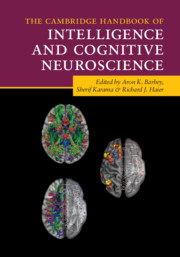Book contents
- The Cambridge Handbook of Intelligence and Cognitive Neuroscience
- Reviews
- The Cambridge Handbook of Intelligence and Cognitive Neuroscience
- Copyright page
- Dedication
- Contents
- Figures
- Tables
- Contributors
- Preface
- Part I Fundamental Issues
- Part II Theories, Models, and Hypotheses
- 5 Evaluating the Weight of the Evidence
- 6 Human Intelligence and Network Neuroscience
- 7 It’s about Time
- 8 A Lifespan Perspective on the Cognitive Neuroscience of Intelligence
- 9 Predictive Intelligence for Learning and Optimization
- Part III Neuroimaging Methods and Findings
- Part IV Predictive Modeling Approaches
- Part V Translating Research on the Neuroscience of Intelligence into Action
- Index
- References
8 - A Lifespan Perspective on the Cognitive Neuroscience of Intelligence
from Part II - Theories, Models, and Hypotheses
Published online by Cambridge University Press: 11 June 2021
- The Cambridge Handbook of Intelligence and Cognitive Neuroscience
- Reviews
- The Cambridge Handbook of Intelligence and Cognitive Neuroscience
- Copyright page
- Dedication
- Contents
- Figures
- Tables
- Contributors
- Preface
- Part I Fundamental Issues
- Part II Theories, Models, and Hypotheses
- 5 Evaluating the Weight of the Evidence
- 6 Human Intelligence and Network Neuroscience
- 7 It’s about Time
- 8 A Lifespan Perspective on the Cognitive Neuroscience of Intelligence
- 9 Predictive Intelligence for Learning and Optimization
- Part III Neuroimaging Methods and Findings
- Part IV Predictive Modeling Approaches
- Part V Translating Research on the Neuroscience of Intelligence into Action
- Index
- References
Summary
Human intelligence is a multifaceted construct that has been defined in many different ways. In the present chapter, we consider intelligence to be a stable behavioral index that provides important predictive value for many complex and adaptive behaviors in life that require problem-solving and integration of multiple cognitive operations. The index is typically developed from measures of basic core cognitive abilities that include fluid reasoning, processing speed, working memory, episodic memory, and verbal ability. Whether intelligence changes with advancing age turns out to be a question that is surprisingly difficult to answer. On one hand, both cross-sectional and longitudinal studies provide evidence that adult intelligence is characterized by predictable normative developmental change with increasing age. This profile shows decline across the adult lifespan on core cognitive measures that comprise intelligence (Park et al., 2002; Salthouse, 2016). On the other hand, although it is certain that a very long life guarantees some decline in core cognitive measures associated with intelligence, the age at which an individual begins to show decline, and how fast they decline, is quite variable (e.g., Salthouse, 2016). Adding to the puzzle of how intelligence is affected by aging, there is also astonishing evidence that intelligence within a given person is highly stable across the individual’s lifespan. The Lothian Cohort Study reported that roughly 45% of the variance in intelligence at age 90 was accounted for by that individual’s level of intelligence at age 11 (Deary, Pattie, & Starr, 2013). The Vietnam Era Twin Study of Aging recently observed a correlation of similar magnitude between intelligence scores taken at age 20 with those taken at age 62 (Kremen et al., 2019).
- Type
- Chapter
- Information
- Publisher: Cambridge University PressPrint publication year: 2021

